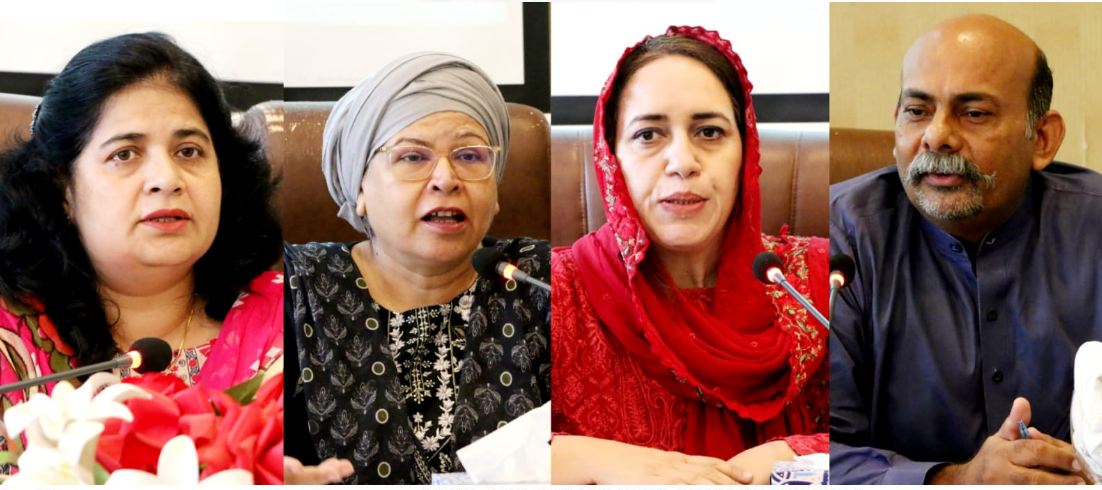Speakers at a seminar on food systems and the role of women emphasized the critical need to empower women in transforming food systems to achieve food nutrition and security. The Sustainable Development Policy Institute (SDPI), in collaboration with the Global Alliance for Improved Nutrition (GAIN), organized the seminar on “Role of Women in Food Systems Transformation to Achieve Food and Nutrition Security” at the PMAS Arid Agriculture University.
Deputy Registrar and Assistant Professor Dr. Nazia Rafique highlighted the importance of saving our planet, lifting people out of poverty, and advancing economic growth as crucial goals. She pointed out major issues faced by society today, including food security, climate change, and women’s empowerment. Dr. Rafique stressed that the solution to food security, global health, and women’s empowerment are interconnected. Health can be achieved through safe and nutritious food, aligning with sustainable development goals aimed at ending hunger through universal food security and sustainable agriculture.
Dr. Rafique also mentioned the expected increase in Pakistan’s population to 350 million by 2050 and the corresponding rise in the demand for food. Women play a crucial role in the food system by contributing to cooking, harvesting, and sowing crops, and therefore should participate in policy formation. To meet future demands, food production must increase, and mitigating risks causing climate change is essential for food security.
Deputy Executive Director of SDPI, Syed Qasim Ali Shah, highlighted that 77 percent of women contribute to agriculture at the farm level in Pakistan, often working more than 50 hours per week. Despite their significant contribution, women receive 35 to 40 percent lower wages compared to men and are sometimes not paid at all when working on their farms, leading to prevalent malnutrition within their households.
Syed Qasim Ali Shah also mentioned that only three percent of agricultural land ownership in Pakistan belongs to women. He stressed on the need to recognize the role and contributions of women in agriculture and allocate more shares to them.
Country Director of GAIN, Farah Naz, emphasized that food systems include cultivation, production, harvesting, and processing of food. She highlighted the over-reliance on staple crops like wheat for 60 to 70 percent of the calories in Pakistan, indicating the need for a more diverse diet.
“Women play a crucial role in agriculture, from farm to fork, particularly in the production of vegetables, cotton picking, and rice planting. At the policy level, climate-resilient agriculture, income, and socioeconomic outcomes are major topics of debate in Pakistan,” she added.
The country faces issues of food affordability and purchasing power, with deficiencies in iron leading to anemia and multiple vitamin deficiencies such as vitamins D, A, B12, and others. Health should be a prime concern, she said.
Last year, she said Pakistan ranked 143 internationally, with its status declining as the potential role of women farmers is not recognized by the government, as they are not reflected in policies, leading to limited training or capacity-building programs for women.“Women should be given a quota based on their contributions, and training should be sector and contribution-oriented.
They should also contribute significantly to policy formation, for example, the participation of women in the National food system pathways for the transformation of food systems in Pakistan. A UN study indicates that including equal numbers of women alongside men could improve generative income by 1 trillion dollars. Women in many communities are street vendors supporting their families and educating them about healthy dietary choices can help solve malnutrition,” she added.
Technical Director, NICB, Dr Abida Raza said one-third of food is either lost or wasted. “There is a need to adopt environment-friendly processing technologies. Malnutrition is also caused by the high consumption of processed foods and the exclusion of natural fruits, vegetables, and dairy products like yogurt and milk from our daily diets,” she said. She added that food systems transformation should focus on innovation in nutrition to ensure food security. Universities should host multiple training sessions, encouraging student participation, as they can carry the message back to their communities.


Comments are closed, but trackbacks and pingbacks are open.